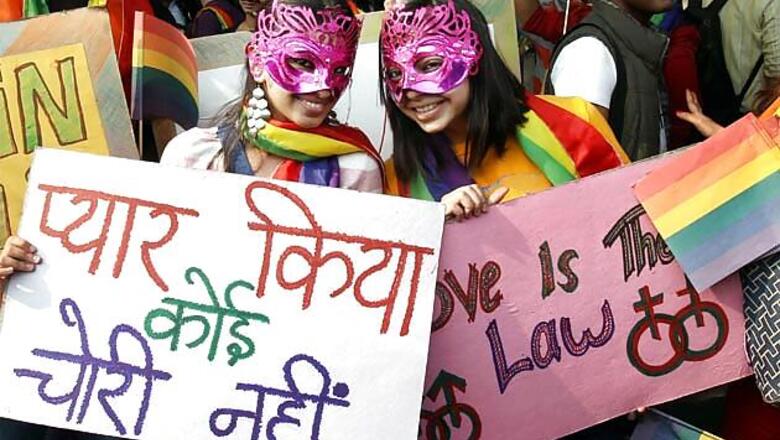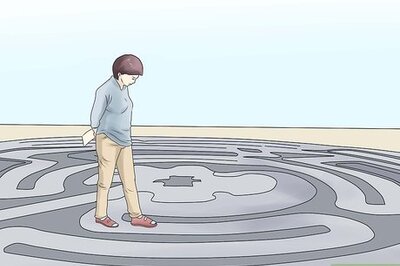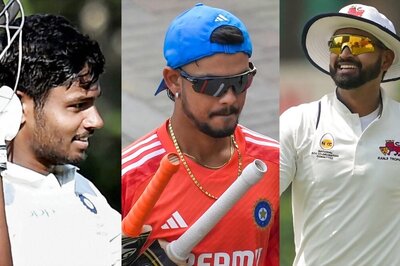
views
New Delhi: The Supreme Court is likely to give its verdict on Section 377 of the Indian Penal Code (IPC) (gay rights) on Wednesday. The Delhi High Court in its 2009 landmark judgement had upheld the rights of gays and lesbians saying that any sort of sexual relationship between the same sex in private is not an offence. This judgement was challenged by some religious groups before the Supreme Court. Both the gay rights activists and the people who consider it unnatural are keenly waiting for the SC verdict.
The SC had reserved its order on May 27, 2012 on several petitions challenging the Delhi High Court judgement decriminalising gay sex among consulting adults in private. Section 377, which the gay activists describe as a draconian law, makes gay sex a criminal offence attracting punishment up to life term.
The gay activists have been fighting for their rights demanding that the Section 377 be scrapped. Senior BJP leader BP Singhal has challenged the High Court verdict in the Supreme Court saying such acts are illegal, immoral and against the ethos of Indian culture. Religious organisations like All India Muslim Personal Law Board, Utkal Christian Council and Apostolic Churches Alliance too have challenged the judgment. The Delhi Commission for Protection of Child Right, Tamil Nadu Muslim Munn Kazhgam, astrologer Suresh Kumar Kaushal and yoga guru Ramdev have also opposed the verdict.
However, the Centre requested the apex court for decriminalising of gay sex. It also told the apex court that the anti-gay law in India had resulted from the British colonialism and the Indian society was much more tolerant towards homosexuality before that.
According to the Centre, there are more than 25 lakh gays in India. About 7 per cent of them are tested HIV positive.
The 2009 Delhi High Court verdict
This judgement decriminalizing the gay sex had led to nationwide celebration among homosexuals. The Delhi High Court had struck down the Section 377 of Indian Penal Code (IPC) saying that it had violated the fundamental right of the individual guaranteed by the Constitution. The PIL before the HC was filed by a Delhi based NGO Naz foundation, which works among the sex workers.
Delivering the judgement a two member bench of the HC comprising justice AP Shah and Justice S Muralidhar had said, "We declare that Section 377 of the IPC, insofar as it criminalises consensual sexual acts of adults in private, is violative of Articles 21 [Right to Protection of Life and Personal Liberty], 14 [Right to Equality before Law] and 15 [Prohibition of Discrimination on Grounds of Religion, Race, Caste, Sex or Place of Birth] of the Constitution. We hold that sexual orientation is a ground analogous to sex, and that discrimination on sexual orientation is not permitted under Article 15. A person below 18 would be presumed not to be able to consent to a sexual act. This clarification will hold till, of course, Parliament chooses to amend the law to effectuate the recommendation of the Law Commission of India in its 172nd Report which, we believe, removes a great deal of confusion."
What is Section 377?
IPC SECTION 377-Unnatural offences. - Whoever voluntarily has carnal intercourse against the order of nature with any man, woman or animal, shall be punished with 1*[imprisonment for life], or with imprisonment of either description for a term which may extend to ten years, and shall also be liable to fine.
Explanation-Penetration is sufficient to constitute the carnal intercourse necessary to the offence described in this section.
Gay rights activists argue that this section is against Article 14, 15, 19 and 21 of Indian Constitution, which guarantees equality and freedom of expression. These articles say that the State shall not deny to any person equality before the law or the equal protection of the laws within the territory of India. The Article 21 guarantees protection of life and personal liberty. It says that no person shall be deprived of his life or personal liberty except according to procedure established by law.
Gay rights: The struggle through the years
2001: NGO Naz Foundation files PIL seeking a reading down of Section 377
September 2004: The Delhi HC dismisses Naz Foundation's PIL on grounds that no cause had been made out and that it had no locus standi to file petition
Dec 2004: Naz approaches Supreme Court against HC order
April 2006: SC sends matter back to HC and asks it to consider case on merit
September 2006: Amartya Sen and Vikram Seth came together with other prominent Indians publicly demanding change in legal regime
June 30, 2008: Oscar Fernandez backed calls for decriminalization of consensual gay sex and Manmohan Singh called for greater tolerances towards homosexuality
July 23, 2008: Bombay High Court Judge Bilal Nazki, said that India's unnatural sex law should be reviewed
August 9, 2008: Anbumani Ramadoss, the then Union Health Minister, campaigned to change Section 377
July 2, 2009: Homosexual intercourse between consenting adults was decriminalized by Delhi High Court
March 27, 2012: The Supreme Court reserved verdict on a batch of appeals filed against Delhi High Court judgement
Gay Rights in other countries
Netherlands - Legal since 2001. First country to legalise same-sex marriage
Belgium - Legal since 2003
Spain - Legal since 2005
Canada - Legal since 2005
South Africa - Legal since 2006
Norway - Legal since 2009
Sweden - Legal since 2009
Portugal - Legal since 2010
Iceland - Legal since 2010
Mexico - Legal in Mexico City since 2010
Caribbean Netherlands - Legal since 2012
Denmark - Legal since 2012
New Zealand - Legal since 2013
France - Legal since 2013
Brazil - Legal since 2013
Uruguay - Legal since 2013

















Comments
0 comment